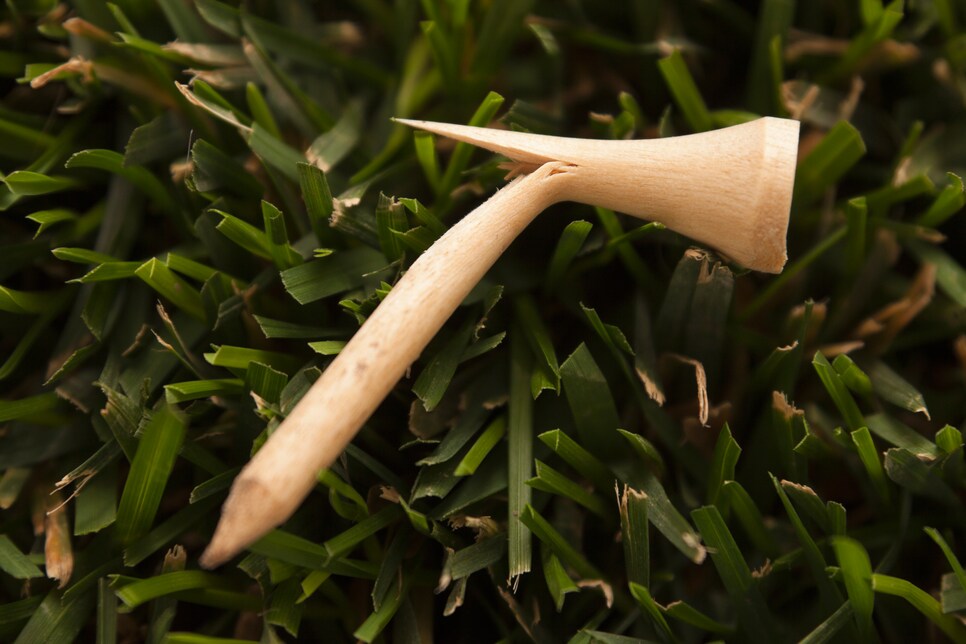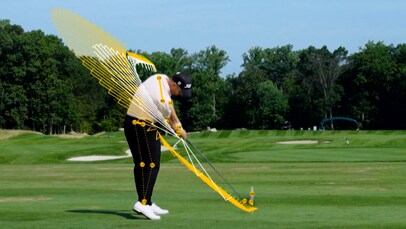Where do you put your broken tees? If you’re like many golfers, you might haphazardly flick them off to the side of the tee markers or in the rough. But from a course maintenance and environmental perspective, does it matter where you put your tee stubs? It might seem like a minor issue, but sometimes the smallest things can cause bigger headaches for grounds crews. We put the question to Brandon Coe, the golf course superintendent at Orchards Golf Club in South Hadley, Mass.
Golf Digest: Brandon, where do you think golfers should discard their broken tees?
Coe: I don't think there's a perfect answer for it. It’s going to differ from golf course to golf course. In a perfect world, if you have a good maintenance budget and you have proper staff, if you're going out daily and you're collecting tees on the tee box, that would be perfect.
But the majority of clubs are probably better off just tossing them into the rough where they can be mulched up by mowers. That’s what I tell members at my club to do. Depending on the rough height, the tees will likely be mulched up by the mower when it goes around. And we use a blade mower in the rough, so it's going to chop it up pretty good, and it's not really a concern for the equipment.
MORE: A day for thanking golf course superintendents should also be about understanding what they do
Either that or the tees are going to get worked in through the profile, and it's just going to end up in the soil where it's eroded over time, especially the wooden tees.

Is there a downside to leaving the stubs on the tee box?
Coe: Yes. I prefer that they get tossed into the rough and mulched up because the worst thing for us as a maintenance staff is having them on the box where mowers are going to catch them. It can do a pretty good number on a reel mower, which is what we use on tee boxes.
They're better off in the rough because we take a typical rotary mower that you use at home, just with a big blade, and it chops the tees up well. It's not going to be any concern for the mower.
Whereas, if they're left on the tee box and not getting picked up on daily, if they get clipped by a mower, it's a different kind of mower. On the tees we use a reel mower that's cutting really tight and at a low height. It's pinching the grass. If you get tees caught up in there frequently, it's going to damage it. So that's our concern because it can add up on the machines being on the tee box.
Tees that are left on the tee box are also a problem because it's an extra hour's worth of collecting the tees so we're not mowing over them. It's an extra strain on the staff. And if you accidentally run over a tee with a mower on the tee box, it can not only damage the mower but it can alter the cut of the grass.
What about on par 3s. Some golfers forget to take out the stubs from the ground after hitting an iron shot. Is that bad?
Coe: Any tees that are even slightly poking up are the worst, especially for the equipment. If you catch that at the right angle, that can do some damage. I prefer they don't get pushed into the ground because they're just going to sit there and if you end up doing any sod work or anything, it's just a pain. It does make an uneven surface from time to time, too. So, again, I would prefer they end up in the rough and get mulched up.
You mentioned wooden tees earlier. Do you have a preference between wooden or plastic tees? Is one better for the environment?
Coe: Wooden tees are preferable. I encourage any members out there, any golfers to focus on wooden tees because they are biodegradable. Plastic tees are a concern for the property as a whole. Wooden tees are cheap and you can buy them in bulk.
I mentioned you should toss your broken wooden tees in the rough, but plastic tees are a different situation. Try and hold on to those because we don't want that kind lying around anywhere. I encourage golfers to make sure they carry them around throughout the round or properly dispose of them in the trash because they're the problem. They're not biodegradable and then they can really damage the equipment, even in the rough.
MORE ASK A SUPER:




